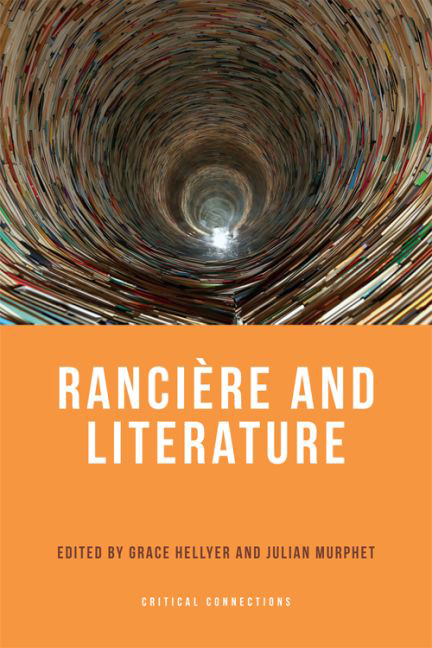Book contents
- Frontmatter
- Contents
- Acknowledgements
- Notes on Contributors
- Introduction: Rancière and Literature
- SECTION I Coordinates
- SECTION II Realisms
- 6 The Novelist and Her Poor: Nineteenth-Century Character Dynamics
- 7 ‘Broiled in Hell-fire’: Melville, Rancière and the Heresy of Literarity
- 8 Why Maggie Tulliver Had To Be Killed
- 9 The Meaning in the Detail: Literature and the Detritus of the Nineteenth Century in Jacques Rancière and Walter Benjamin
- SECTION III Contemporaneities
- Index
7 - ‘Broiled in Hell-fire’: Melville, Rancière and the Heresy of Literarity
from SECTION II - Realisms
Published online by Cambridge University Press: 15 September 2017
- Frontmatter
- Contents
- Acknowledgements
- Notes on Contributors
- Introduction: Rancière and Literature
- SECTION I Coordinates
- SECTION II Realisms
- 6 The Novelist and Her Poor: Nineteenth-Century Character Dynamics
- 7 ‘Broiled in Hell-fire’: Melville, Rancière and the Heresy of Literarity
- 8 Why Maggie Tulliver Had To Be Killed
- 9 The Meaning in the Detail: Literature and the Detritus of the Nineteenth Century in Jacques Rancière and Walter Benjamin
- SECTION III Contemporaneities
- Index
Summary
In an early chapter of Moby-Dick, the narrator circles around the question of what it might mean to render the mode of dignity and grandeur proper to the democratic subject:
this august dignity I treat of, is not the dignity of kings and robes, but that abounding dignity which has no robed investiture. Thou shalt see it shining in the arm that wields a pick or drives a spike; that democratic dignity which, on all hands, radiates without end from God; Himself! The great God absolute! The center and circumference of all democracy! His omnipresence, our divine equality!
The narrator draws a distinction here between ‘man, in the ideal’ and men, who ‘may seem detestable as joint stock companies and nations’. This distinction, he suggests, will give a paradoxical quality to his writing, causing him to ascribe ‘high qualities’ to ‘low’ subjects such as ‘meanest mariners, and renegades, and castaways’:
if I shall touch that workman's arm with some ethereal light; if I shall spread a rainbow over his disastrous set of sun; then against all mortal critics bear me out in it, thou just Spirit of Equality, which has spread one royal mantle of humanity over all my kind! Bear me out in it, thou great democratic God!
Starting from the presupposition that Moby-Dick constitutes an attempt to write as if the Declaration of Independence made a difference, this chapter will explore the question of what such an attempt might entail. In a letter to Nathaniel Hawthorne from the period of the novel's composition, Melville hints at a heresy at the heart of the novel, describing it as ‘broiled’ in ‘hell-fire’, and as having a secret motto: ‘Ego non baptiso te in nomine – but make out the rest yourself.’ The heresy turns out to be Ahab's Promethean attack on nature – the words are placed in his mouth as he baptises his newly forged harpoon in the blood of several of the ‘pagan’ members of his crew – but I want to look past this moment of high drama at a different mode of heresy, one that also shapes the text, disrupting and warping the categories that structure its representation of the doomed crew of the Pequod.
- Type
- Chapter
- Information
- Rancière and Literature , pp. 143 - 163Publisher: Edinburgh University PressPrint publication year: 2016



